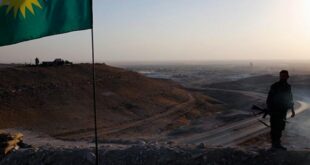RAMALLAH — A Palestinian festival showcasing women filmmakers has battled against Israeli closures, rampant insecurity, recession and funding shortages to promote cinema in Gaza and the West Bank.
“It’s hard to work in films here,” said Alia Arasoughly, who runs Shashat, a non-profit organisation focusing on women’s cinema which is running the festival — being staged across the Palestinian territories until December.
Liana Badr, whose documentary “The Gates Are Open Sometimes” is featured in the three-month festival, says she endured threats and intimidation from Israeli troops when trying to film near the West Bank separation barrier.
“The area is a military area and we’re not allowed to photograph, even come with a camera. So it was horrible. We had to have a lot of courage. “I had a panic attack near the village of Jayyus for the first time in my life … because the Israeli soldiers were pointing weapons at my chest.”
Public cinemas barely exist in the Palestinian territories outside Jerusalem and Ramallah. Most filmmakers are better known abroad than at home in an industry whose practitioners face severe difficulties in getting their films funded, shot and edited.
Hence the reasoning behind what is the second ever women’s film festival — organised to make Palestinians aware of the work of 11 local women filmmakers and to promote culture in more isolated pockets of the Gaza Strip and the West Bank.
Arasoughly’s maxim is that film is for everyone not just the elite, is depressing business at a time of huge domestic recession, stifling Israeli closures and rampant insecurity. Donors are increasingly focused on emergency food and employment aid. Helped in part by the election of Islamic movement Hamas and the deteriorating conditions facing Palestinians, tastes are becoming more conservative.
“So much of the funding comes from abroad and the donor community prioritises emergency aid. It is a real struggle,” she said.
The festival itself has also run into countless problems.
One screening was cancelled in the northern West Bank town of Nablus owing to a general strike and intra-Palestinian clashes.
Last month, a group from Ramallah was unable to get to Jerusalem because of Israeli checkpoint restrictions and two other film-screening venues — government-subsidised colleges — are on strike owing to lack of pay.
“For every single act you have to calculate twice as much time.
Everything requires four times as much effort,” sighed Arasoughly, an elegant woman with a PhD in cinema.
Yet audiences have been good. She says scores of people have flocked to showings. In the southern Gaza Strip, where electricity is strictly rationed after Israel bombed the only power station, a film was shown by generator.
“Rafah had been bombed [during an ongoing Israeli offensive] that morning and they ran the film in the afternoon. Why? Because we’re not animals.”
Critic Yousef Shayeb says a string of recent Palestinian successes, such as Oscar-nominated “Paradise Now” has opened the door to Palestinian filmmakers to make films with worldwide appeal.
“There is a need to tell the Palestinian story in a language that can be heard in the world, not by shouting,” he said, highlighting young director Liana Saleh and fellow filmmaker Najwa Najjar.
Still studying in Paris, Saleh won a prize from pan-Arab television network Al-Jazeera for her short film “A Ball and a Colouring Box” about the dreams of Palestinian children living amid death and occupation in the West Bank.
“This is Liana’s first film and she is the youngest filmmaker in Palestine. It’s amazing to have a 17-year-old girl make a good film about the dreams of Palestinian children,” Shayeb said.
Najjar’s debut feature “Yasmine Tughani”, beautifully shot in scenes that more closely ressemble Tuscany than the gritty documentaries featured in the festival, tells the story of young lovers thwarted by the separation barrier.
Despite the problems, many of the filmmakers have won international prizes for work that focuses on the human cost to their fellow Palestinians from the Middle East conflict, albeit with little regard for Israel’s concerns.
Ghada Terawi, who produces thought-provoking documentaries, has had her work sponsored by the US-based Sundance Institute founded by veteran Hollywood start Robert Redford.
Arasoughly and three other filmmakers will travel to London this month after being selected to make shorts for a “three-minute wonder” series to be broadcast by Britain’s Channel 4 television.
 Eurasia Press & News
Eurasia Press & News



